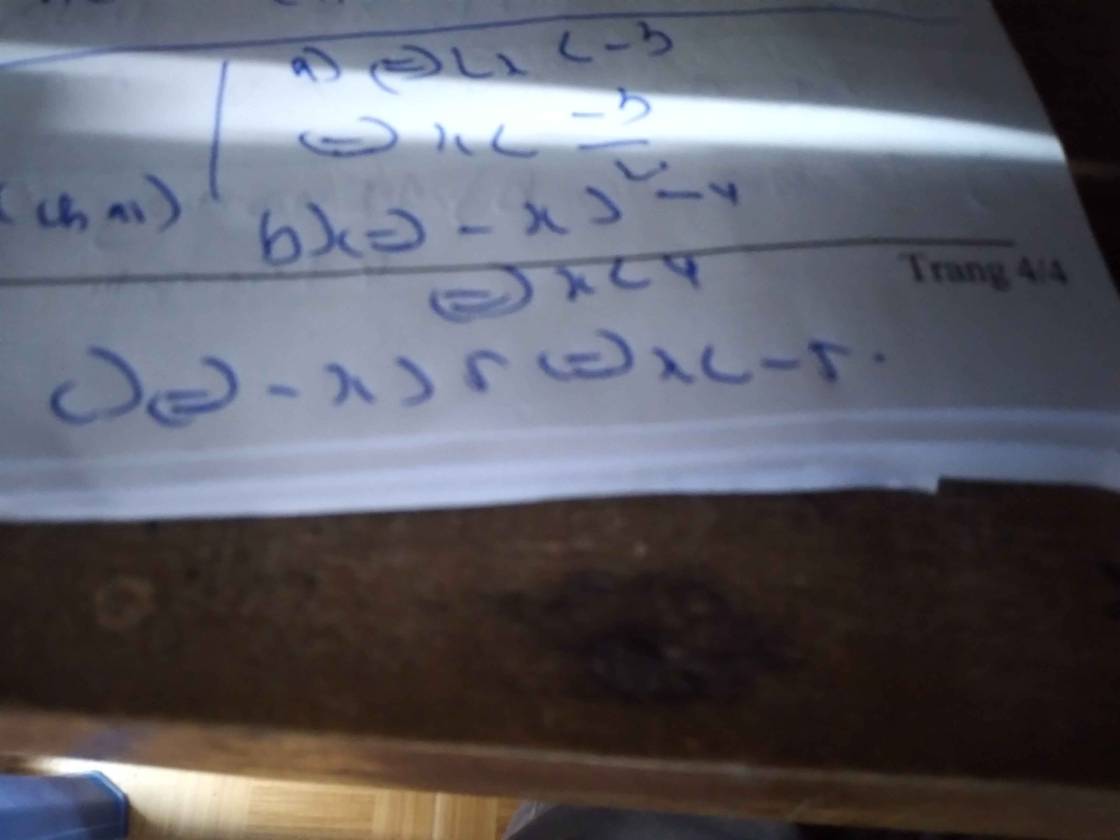Giải bất phương trình: 2x(6x - 1) > (3x - 2)(4x + 3)
Hãy nhập câu hỏi của bạn vào đây, nếu là tài khoản VIP, bạn sẽ được ưu tiên trả lời.


a) \(\dfrac{15-6x}{3}>5\Leftrightarrow15-6x>15\)
\(\Leftrightarrow-6x>0\Leftrightarrow x< 0\) (vì \(-6< 0\))
\(S=\left\{x|x< 0\right\}\)
b) \(\dfrac{8-11x}{4}< 13\Leftrightarrow8-11x< 52\)
\(\Leftrightarrow-11x< -44\Leftrightarrow x>4\) (vì \(-11< 0\))
\(S=\left\{x|x>4\right\}\)
c) \(8x+3\left(x+1\right)>5x-\left(2x-6\right)\)
\(\Leftrightarrow8x+3x+1>5x-2x+6\)
\(\Leftrightarrow8x+3x-5x+2x>6-1\)
\(\Leftrightarrow8x>5\)
\(\Leftrightarrow x>\dfrac{5}{8}\) (vì \(8>0\))
\(S=\left\{x|x>\dfrac{5}{8}\right\}\)
d) \(2x\left(6x-1\right)>\left(3x-2\right)\left(4x+3\right)\)
\(\Leftrightarrow12x^2-2x>12x^2+9x-8x-6\)
\(\Leftrightarrow12x^2-2x-12x^2-9x+8x>-6\)
\(\Leftrightarrow-3x>-6\)
\(\Leftrightarrow x< 2\) (vì \(-3< 0\))
\(S=\left\{x|x< 2\right\}\)
a) \(\dfrac{15-6x}{3}>5\) <=> \(15-6x>15\) <=> \(6x< 0\) <=> \(x< 0\)
b) \(\dfrac{8-11x}{4}< 13\) <=> \(8-11x< 52\) <=> \(11x>-44\)<=> \(x>-4\)
c) \(8x+3\left(x+1\right)>5x-\left(2x-6\right)\)
<=> 8x + 3x + 3 - 5x + 2x - 6 > 0
<=> 8x > 3
<=> x > 3/8
d) 2x(6x - 1) > (3x - 2)(4x + 3)
<=> 12x2 - 2x > 12x2 + x - 6
<=> 12x2 - 2x - 12x2 - x > -6
<=> -3x > -6
<=> x < 2

Bài 1:
a) Ta có: \(2\left(3-4x\right)=10-\left(2x-5\right)\)
\(\Leftrightarrow6-8x-10+2x-5=0\)
\(\Leftrightarrow-6x+11=0\)
\(\Leftrightarrow-6x=-11\)
hay \(x=\dfrac{11}{6}\)
b) Ta có: \(3\left(2-4x\right)=11-\left(3x-1\right)\)
\(\Leftrightarrow6-12x-11+3x-1=0\)
\(\Leftrightarrow-9x-6=0\)
\(\Leftrightarrow-9x=6\)
hay \(x=-\dfrac{2}{3}\)

\(a,bpt\Leftrightarrow2x>-18\Leftrightarrow x>-9\)
\(b,bpt\Leftrightarrow-5x< 120\Leftrightarrow x>-24\)
\(c,bpt\Leftrightarrow-x>-4\Leftrightarrow x< 4\)

\(a,\dfrac{x-3}{x}=\dfrac{x-3}{x+3}\)\(\left(đk:x\ne0,-3\right)\)
\(\Leftrightarrow\dfrac{x-3}{x}-\dfrac{x-3}{x+3}=0\)
\(\Leftrightarrow\dfrac{\left(x-3\right)\left(x+3\right)-x\left(x-3\right)}{x\left(x+3\right)}=0\)
\(\Leftrightarrow x^2-9-x^2+3x=0\)
\(\Leftrightarrow3x-9=0\)
\(\Leftrightarrow3x=9\)
\(\Leftrightarrow x=3\left(n\right)\)
Vậy \(S=\left\{3\right\}\)
\(b,\dfrac{4x-3}{4}>\dfrac{3x-5}{3}-\dfrac{2x-7}{12}\)
\(\Leftrightarrow\dfrac{4x-3}{4}-\dfrac{3x-5}{3}+\dfrac{2x-7}{12}>0\)
\(\Leftrightarrow\dfrac{3\left(4x-3\right)-4\left(3x-5\right)+2x-7}{12}>0\)
\(\Leftrightarrow12x-9-12x+20+2x-7>0\)
\(\Leftrightarrow2x+4>0\)
\(\Leftrightarrow2x>-4\)
\(\Leftrightarrow x>-2\)

\(4x^4+4x^3+x^2+3x\ge0\)
\(4x^4+4x^2+1-\left(2x^4+6x^3-2x^2+4x-1\right)=\left(x^2-x+1\right)\sqrt{\left(x^2-x+1\right)\left(2x^2+1\right)+2x^4+6x^3-2x^3+4x-1}\)
\(\Leftrightarrow\left(2x^2+1\right)^2-\left(2x^4+6x^3-2x^2+4x-1\right)=\left(x^2-x+1\right)\sqrt{\left(x^2-x+1\right)\left(2x^2+1\right)+2x^4+6x^3-2x^3+4x-1}\)
\(2x^2+1=u;\sqrt{4x^4+4x^3+x^2+3x}=v\left(u>0;v>0\right)\)
\(\hept{\begin{cases}u^2-\left(2x^4+6x^3-2x^2+4x-1\right)=\left(x^2-x+1\right)v\\v^2-\left(2x^4+6x^3-2x^2+4x-1\right)=\left(x^2-x+1\right)u\end{cases}\Rightarrow u^2-v^2=\left(x^2-x+1\right)\left(v-u\right)\Leftrightarrow\orbr{\begin{cases}u=v\\u+v+x^2-x+1=0\end{cases}}}\)
- \(u+v+x^2-x+1=0\Leftrightarrow u+v+\left(x-\frac{1}{2}\right)^2=-\frac{3}{4}\)
- \(u=v\Leftrightarrow4x^4+4x^2+1=4x^4+4x^3+x^2+3x\Leftrightarrow\left(x-1\right)^3=-3x^3\Leftrightarrow x-1=-x\sqrt[3]{3}\Leftrightarrow x=\frac{1}{1+\sqrt[3]{3}}\)Đối chiếu điều kiện ta thu được nghiệm duy nhất \(x=\frac{1}{1+\sqrt[3]{3}}\)

2:
a: =>2x^2-4x-2=x^2-x-2
=>x^2-3x=0
=>x=0(loại) hoặc x=3
b: =>(x+1)(x+4)<0
=>-4<x<-1
d: =>x^2-2x-7=-x^2+6x-4
=>2x^2-8x-3=0
=>\(x=\dfrac{4\pm\sqrt{22}}{2}\)



2x(6x – 1) > (3x – 2)(4x + 3)
⇔ 12x2 – 2x > 12x2 – 8x + 9x – 6
⇔ 12x2 – 2x – 12x2 + 8x – 9x > -6 (Chuyển vế, đổi dấu)
⇔ -3x > -6
⇔ x < 2 (Chia cả hai vế cho -3 < 0, BPT đổi chiều)
Vậy bất phương trình có nghiệm x < 2.